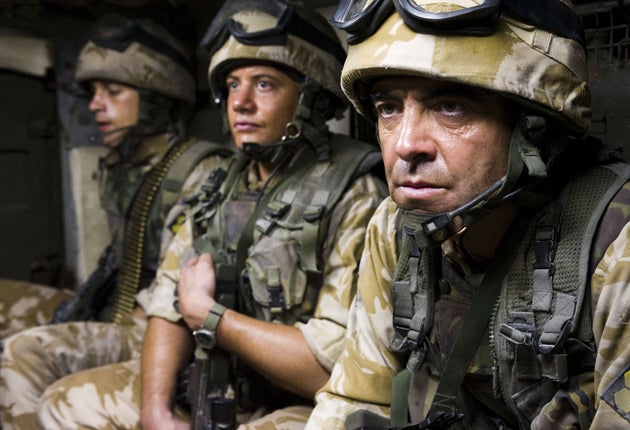Occupation, BBC1<br>Dispatches: Afghanistan's Dirty War, Channel 4
The British experience in Basra made harrowing drama, but a documentary about Afghanistan was worse

It's a decade since Warriors, Peter Kosminsky's landmark TV drama about the effects of the Bosnian war on the British servicemen who suffered through it: high time someone gave the Iraq war similar treatment.
Occupation began in 2003, in the back of an armoured personnel carrier in Basra, as three soldiers – Hibbsy the optimist, Danny the realist, and the melancholy Mike – headed towards a violent encounter that would tie them all to the conflict for the next five years. A saga that started with light-hearted piss-taking and camaraderie ended, a gruelling three hours (and two days) later, in silence and deep sadness.
Made by Kudos and BBC Northern Ireland, Occupation was a predictably masterly production. It hit all the necessary targets for a drama of modern warfare, from press conferences to execution videos, from ruthless mercenaries to naive, liberal family members. The cast was led by James Nesbitt (as Mike), who can knit a brow tighter than any man, and has grown from the cheeky chappie of Cold Feet into one of our greatest television actors; and the compact, volatile Stephen Graham (as Danny), a sort of scouse Long Good Friday-era Bob Hoskins.
The failure of the coalition's "liberation" project was encapsulated in the slow, steady decline of Iraqi women's rights. When Mike first met Aliya (the excellent Lubna Azabal) during the invasion, she was a confident doctor in an under-resourced Basra hospital, cracking jokes as she operated. By the time we left her in 2008, she was wrapped in a headscarf, able to speak to him – though forbidden from looking at him – only with a male Iraqi chaperone present.
Writer Peter Bowker has said he avoided competing with the plentiful Iraq documentaries or news footage; Occupation aimed for drama, not for realism. There's a difference, however, between realism and plausibility. The bleak climax, when Mike lost two loved ones simultaneously – in connected, but essentially separate, circumstances – stretched the bounds of plausibility. For a moment, I stopped believing in it.
The producers have also been at pains to emphasise their apolitical stance, yet Occupation fits the consensus that Iraq is a "bad" war, just as Vietnam was a "bad" war, and the Second World War was a "good" war. Thus it necessarily concludes that those who fight there return home psychologically scarred, alienated from their families and friends. Let's not make the mistake of thinking this is the experience of every soldier – even though, as Occupation proved, it's the sort that makes the best drama.
Some still think of the ongoing conflict in Afghanistan as a "good" war. They may change their minds after watching the latest Dispatches, Afghanistan's Dirty War. Last August, US troops went looking for Taliban insurgents in Aziz Abad, a small village 400 miles west of Kabul. After a brief firefight, they called in an air strike, whereupon an AC-130 gunship tore the village apart.
Immediately following the attack, the Americans claimed to have engaged the Taliban with no civilian casualties. Dispatches's investigation told a different story: about 90 civilians died in the raid, with the local police chief estimating that at least 50 of them were children. Subsequent American inquiries dismissed the casualty estimates of the UN and the Red Cross, exonerating US troops and insisting that Taliban fighters were among the dead.
It later emerged, however, that their intelligence had been murky at best, and probably provided by the leader of a rival clan from another village, who was keen to see his own cohorts employed at the local US airbase – and willing to eliminate the competition by any means necessary. Even more troubling was the tale of another local man, arrested by US personnel and taken to the base, only to turn up four hours later, having been tortured to death.

Watch Apple TV+ free for 7 day
New subscribers only. £9.99/mo. after free trial. Plan auto-renews until cancelled.
ADVERTISEMENT. If you sign up to this service we will earn commission. This revenue helps to fund journalism across The Independent.

Watch Apple TV+ free for 7 day
New subscribers only. £9.99/mo. after free trial. Plan auto-renews until cancelled.
ADVERTISEMENT. If you sign up to this service we will earn commission. This revenue helps to fund journalism across The Independent.
The documentary, unlike US investigators, gave credence to the compelling first-hand testimony of villagers. President Obama's imminent troop surge, it suggested, will count for nothing if civilians continue to die and the coalition forces lose the support of the Afghan people. The most moving interview was with six-year-old Karzai, whose parents named him after the Afghan president as a mark of their hopes for their country. That was before Karzai lost his father and brother – in an American air strike.
Join our commenting forum
Join thought-provoking conversations, follow other Independent readers and see their replies
Comments
Bookmark popover
Removed from bookmarks